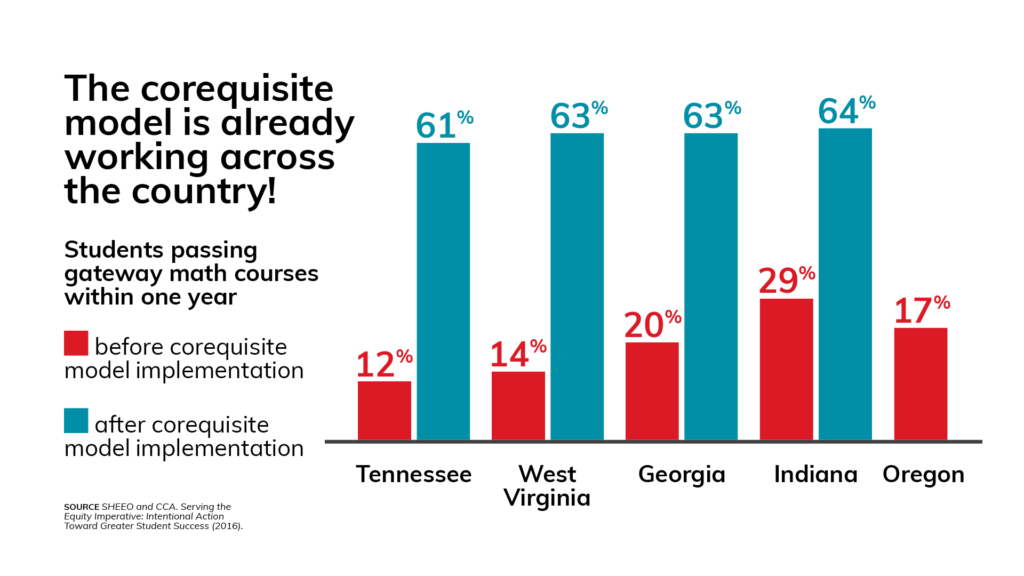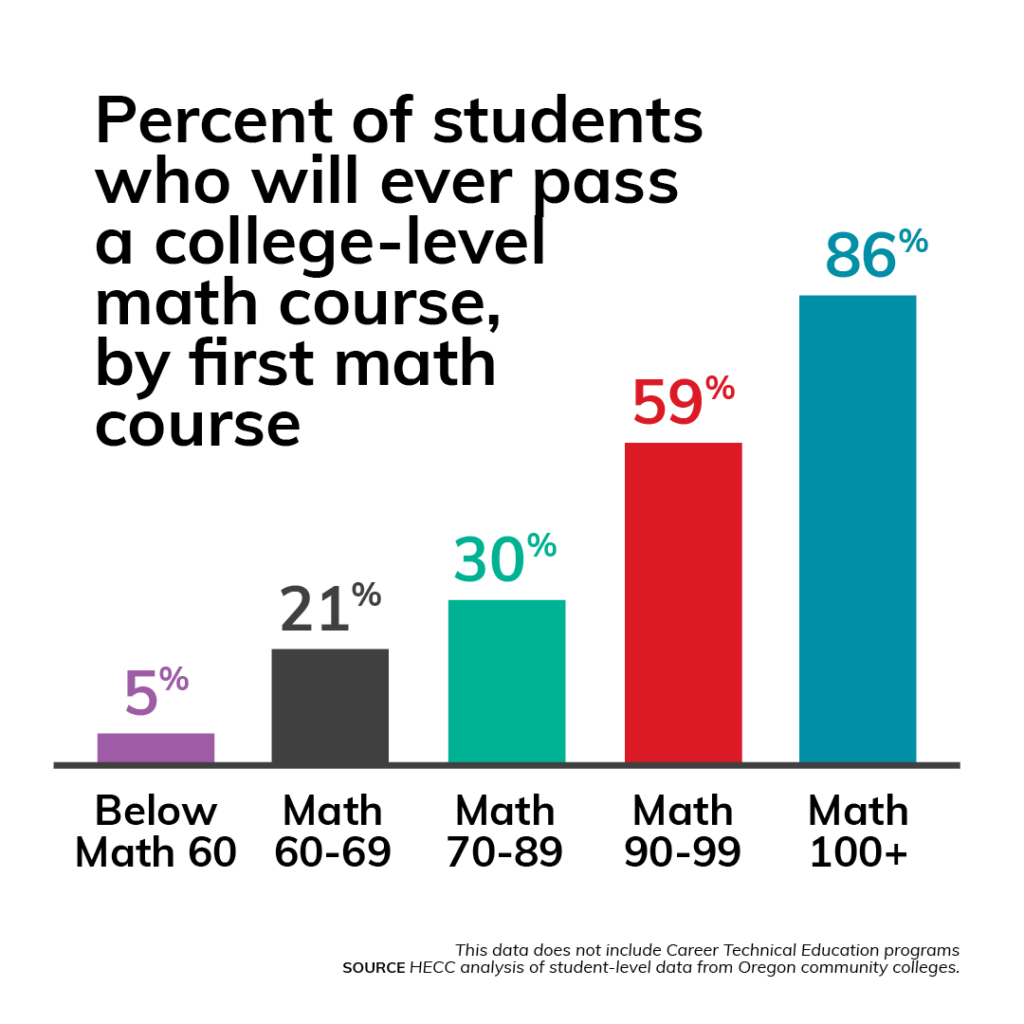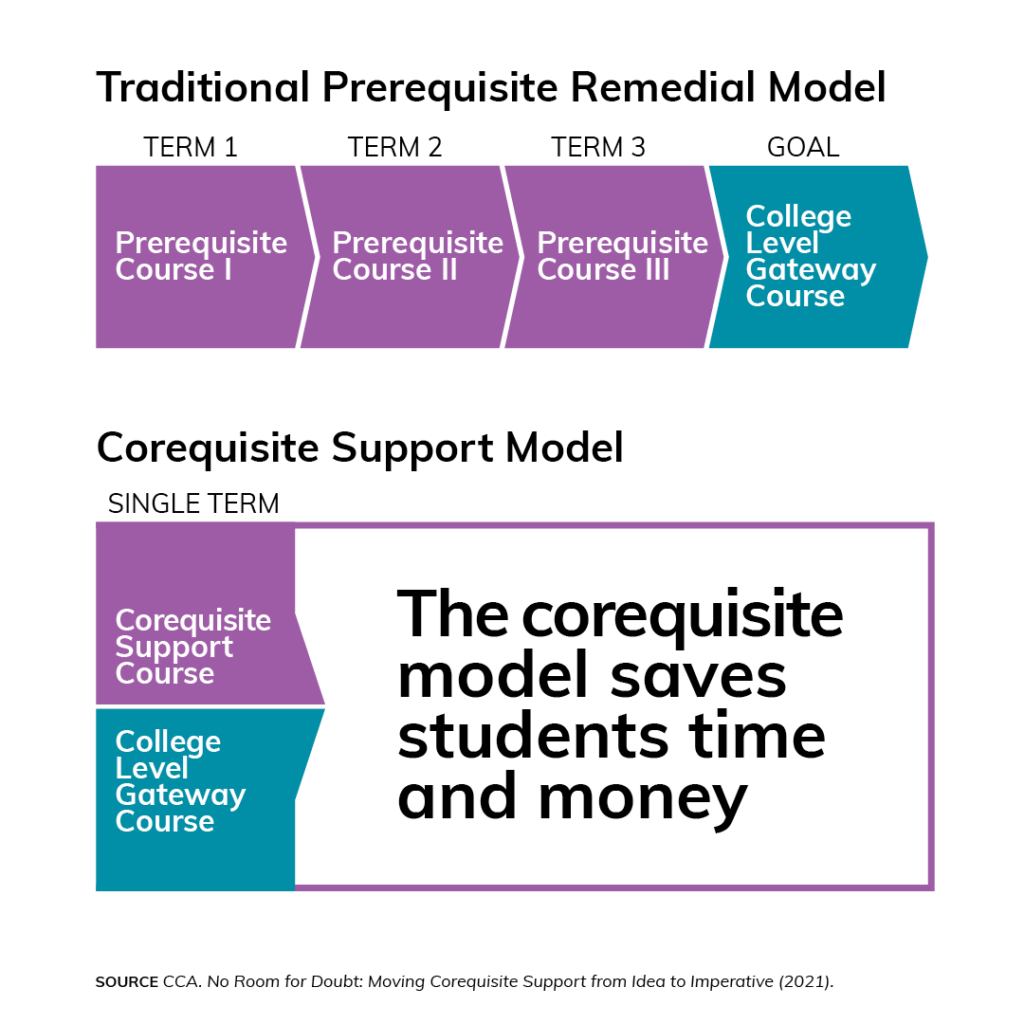Corequisite Student Supports

Let’s Help Our Students Graduate On Time and With Less Debt
How do we ensure that our school is truly accessible to diverse students and all students are set up for college success?
One effective way is to offer corequisite math courses in the first year of college. Corequisites are an alternative to traditional developmental education that have been shown to increase pass rates and improve equitable outcomes. Research shows they help college students graduate on time and with less debt.
Around the country, corequisites work.
Corequisite math has been shown to help all students, and is particularly supportive for students who have been underserved by our educational system. This includes students of color and economically disadvantaged students, who are placed in remedial prerequisites at disproportionately high rates. We can employ this approach to serve our students in Oregon as well.

Corequisites – A Better Alternative To Traditional Remediation
 Currently many students—including a disproportionate number of historically underserved populations—are placed in developmental math, which is characterized by low pass rates and low persistence rates. When students are placed into these remedial prerequisites, it can prevent them from building the momentum they need to earn their credential. These students are more likely to rack up debt taking multiple terms of prerequisites and drop out.
Currently many students—including a disproportionate number of historically underserved populations—are placed in developmental math, which is characterized by low pass rates and low persistence rates. When students are placed into these remedial prerequisites, it can prevent them from building the momentum they need to earn their credential. These students are more likely to rack up debt taking multiple terms of prerequisites and drop out.
Prerequisites are one of many systemic barriers that particularly impact those who have already been marginalized by our education system, including students who are:
- Black
- Indigenous
- People of color
- Immigrants
- Migrants
- From rural areas
- Experiencing poverty
The data shows more students succeed with supports from corequisites.

How do corequisites work?
Corequisite math offers an effective alternative to unnecessary systemic barriers such as developmental math. Students are placed in college-level math upon entering community college or university, while also getting extra support to learn and understand the curriculum. The corequisite course provides background knowledge, reviews material, and previews upcoming topics.
This strategy builds on Oregon’s existing student success efforts, such as Guided Pathways and Math Pathways, and has been shown to increase pass rates. For faculty, administrators, and advisors who have been immersed in that work, this is not something totally new, it’s a logical next step in student-focused practices.

Let’s work together to offer students more effective opportunities to a strong start.
We know that when students do well in school, it has a ripple effect throughout entire communities. Our students can achieve more. By implementing corequisite math, we can provide them with equitable support to achieve their academic goals.
Corequisite Work group (Senate Bill 1552)
Oregon’s Legislature approved Senate Bill 1552 in the 2024 Legislative Session, which requires the Higher Education Coordinating Commission (HECC) to convene a work group to study evidence-based corequisite student support models, including models that use in-class tutoring, online learning labs, paired courses, and other aligned academic supports.
Work Group Charge
(a) Determining whether to require the community colleges in Oregon to implement evidence-based corequisite student support models and identifying the most effective models to implement;
(b) Identifying the steps and resources required for community colleges in Oregon to transition from traditional prerequisite development education to evidence-based corequisite student support models;
(c) Identifying the steps and resources required for community colleges in Oregon to implement corequisite student support models in conjunction with courses of study in mathematics;
(d) Determining whether evidence-based corequisite student support models should be funded by Community College Support Fund (CCSF) grants;
(e) Identifying any statutory changes or administrative rule changes necessary to provide and fund evidence-based corequisite student support models; and
(f) Identifying how to determine if a person should participate in a corequisite, and
whether participation should be voluntary or mandatory.
Deadline
The work group shall submit to the HECC a report on the study conducted based on the group’s charge no later than December 15, 2024.
Work group Membership
REPRESENTED GROUP
CCWD Director
Research Center
CC Faculty teaching coreq or developmental education
CC Faculty teaching first college-level course
Faculty Union
Oregon Presidents’ Council
Council of Academic Officers
OCABSD
Council of Student Support Administrators
CC Student
Facilitators: Kathleen Almy & Sean Newmiller, Almy Education
NAME
Donna Lewelling
Elizabeth Cox Brand
Celeste Peterson
Adrienne Mitchell
Eileen Sather
Keith Schloeman
Heiko Spoddeck
Taylor Donnelly
Traci Hodgson
Patty Scott
Ann Buchele
Kelley Keith
Juliet Long
Jennifer Hughes
COLLEGE/ORGANIZATION
CCWD/HECC
OCCA/Student Success Center
Clatsop CC
Lane CC
Central Oregon CC
Chemeketa CC
Portland CC
Clackamas CC
Chemeketa CC
Southwestern Oregon CC
Linn-Benton CC
Mt. Hood CC
Rogue CC
Clatsop CC
Resources For Implementing Corequisite Math
We understand that faculty and advisors have a lot on their plates and implementing a new strategy takes work and planning. To help make implementation as simple and effective as possible, we have created and compiled resources, and are holding regular conversations to share learnings.
Implementation Recommendation Matrix
Report: Corequisite Works: Student Success Models at the Univesity System of Georgia (Complete College America, 12/7/2021)
Article: Corequisite courses gain momentum (Inside Higher Ed, 7/19/2023 – Oregon’s work featured)
Past Webinar Resources
Corequisite Math Pedagogy 101
- Victoria Dominguez PowerPoint (Corequisite Course Pedagogy)
- Corequisite Math Pedagogy Reflection
- Joan Zoellner PowerPoint (Corequisite Course Pedagogy)
- Webinar Attendee Report
Curriculum Planning for "Just in Time Support"
- Curriculum Planning for Just-In-Time Support (PowerPoint)
- Bingo Scavenger Hunt Ice Breaker
- Brainology by Carol Dweck
- Corequisite Remediation Handout – Math
- Facilitating Group Work & Group Cards
- Growth Mindset Diagram
- Homework Reflection
- Key to Success – Grit
- Let Learners Struggle Homework (from Cuyamaca College)
- One-Minute Paper Reflection After Exam 1
- Scavenger Hunt Activity for Corequisite Math Courses (Instructor Version from Citrus College)
Active Learning Techniques in Math
- Active Learning Techniques in Math by Victoria Dominguez (PowerPoint)
- Active & Collaborative Learning by Joan Zoellner (PowerPoint)
- Webinar Attendee Report
- Webinar Recording Link (passcode: 6SR=C7Rr)
Peer Support
Message with fellow faculty and advisors from other community colleges and universities to troubleshoot problems and share successes. Plus, access resources from other states and institutions to help build your program or lesson plan. Check it out in Basecamp.
Messaging and Content
Need to communicate about corequisite math? We’ve developed messaging, data visualization, and content for you to share on your website, social media, e-newsletters, and wherever else. Check it out in Basecamp.
Data and Research
We’ve compiled the research that tells the story of why corequisites work. Dig deep into the reports and find compelling data. Dig deeper in Basecamp.

